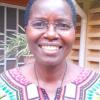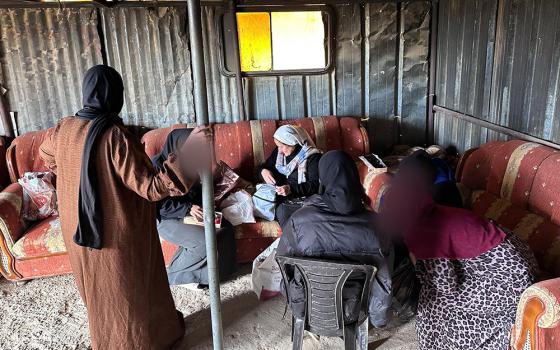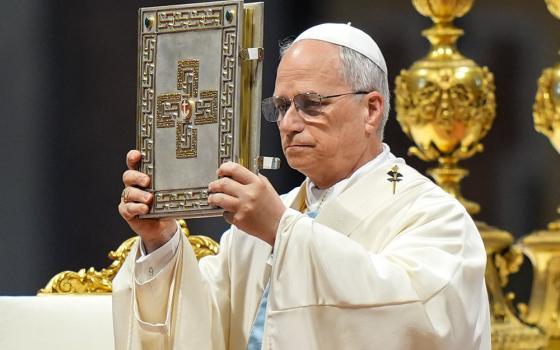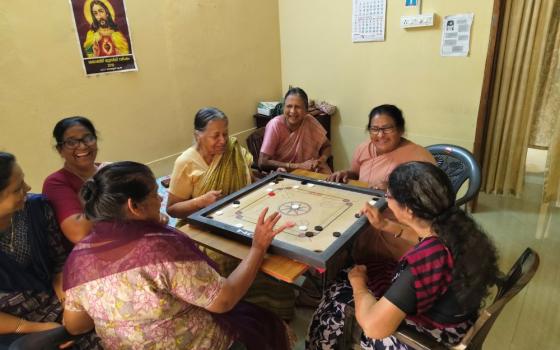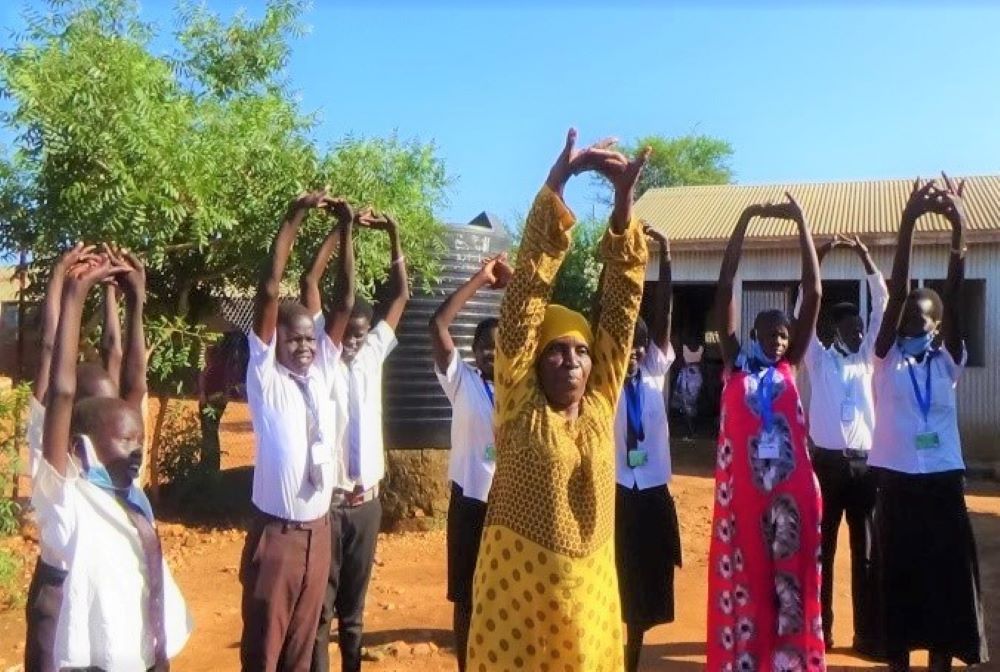
South Sudanese students at a trauma healing workshop participate in the touching heaven exercise, a Capacitar technique intended to help people release excessive or blocked energy in the body due to trauma. (Courtesy of Christy John)
The Solidarity with South Sudan trauma healing volunteers presented a workshop in August for Nile Primary School students in the internally displaced people's (IDP) camp in the outskirts of Juba city. These students all had experienced trauma. Some had been refugees in the neighboring countries of Uganda, Kenya, Ethiopia and Sudan, only recently returning to South Sudan.
Sadly, thousands of South Sudanese continue to live as refugees in neighboring countries — prevented from returning to reclaim their farmlands for fear of ethnic violence and insecurity. Many who have dared come back lack the courage to return to their childhood villages to build houses or cultivate the land. They feel safer living in temporary shelters near towns or in the IDP camps.
Since 2010 Solidarity has continued to support and empower individuals to heal from past traumas, and this was one of many such workshops the group runs across the Republic of South Sudan. The program is run by a trained core group of volunteers under the supervision of Solidarity's pastoral team. The workshop aimed to help participants understand trauma, wellness and wholeness, and to appreciate body literacy to enhance healing using Capacitar methodology.
The workshop started by introducing the students to the concept of trauma. This was done through an interactive session in which students shared definitions of trauma as they understood it.
The students' definitions quickly showed that these children were born in the context of war, which shaped their concept of trauma. A majority defined trauma as a terrible event causing one to feel mistrust, anger and resentment for tribes other than their own. It was evident that these displaced children associated their feelings of hurt and retaliation with what they saw as grave injustice done to their South Sudanese society by many years of civil war. These students viewed themselves as victims of their circumstances.
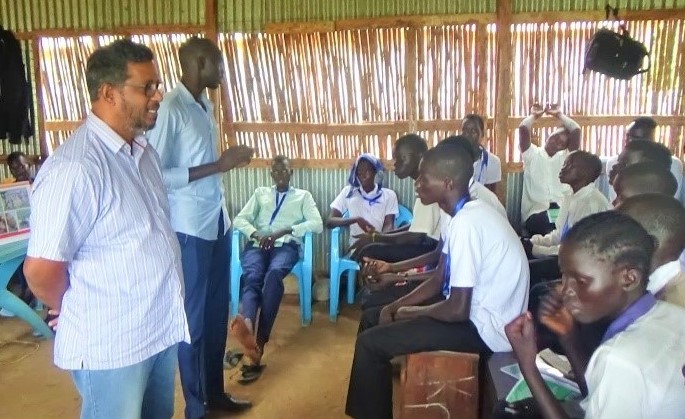
Claretian Fr. Christy John, a member of the Solidarity with South Sudan pastoral team, facilitates a workshop called Peace, Justice and Reconciliation. (Courtesy of Christy John)
What was inspiring was the high level of confidence and resilience portrayed by these youngsters, seemingly poised to beat all odds, and eventually emerge as liberators and co-authors of their destiny.
As might be expected, a capacity-building workshop provides a skill set that empowers participants with knowledge and confidence needed to negotiate challenges in their daily lives. The Capacitar method can be understood and used by almost any person seeking wellness and wholeness. One does not need to be a professional to understand the exercises. Using this method, the volunteers helped the students to identify their trauma symptoms, work toward healing and facilitate post-traumatic growth.
Since its inception in 2010, the Solidarity trauma healing program in South Sudan has continued to support trauma-healing and peace-building among communities. This is done mainly through workshops, and by using Capacitar exercises, art and storytelling. This approach has proved helpful in minimizing the harmful effects of trauma as well as interrupting the cycles of intercommunity violence common in South Sudan.
We hoped training these students would allow the skills to cascade to the communities living in the IDP camp and help many trauma-survivors in their own recovery toward wellness and wholeness.
UNICEF has said that youth are one of society's main agents of change and progress. Cognizant of this, and in partnership with the Nile Primary School, Solidarity trauma healing volunteers — under the guidance of Claretian Fr. Christy John, the pastoral team facilitator — organized the five-day interactive workshop for 50 students. The workshop focused on healing the detrimental effects of trauma; increasing trust and empathy, reconciliation; and relationship-building among individuals and communities living in the IDP camp.
Through engagement in Capacitar exercises, storytelling and sharing experiences, students were helped to reduce their sense of victimization and trauma reactions as well as start building positive relationships and trust in school and in the IDP camp. Based on input from the first workshop, the team will soon train a group of students and teachers "Trainer of Trainers," who will facilitate trauma healing workshops in the school and camp.
As students and teachers told their stories, it was evident that the challenges endured by the participants cut across tribal boundaries. The immensity of pain, loss and the sense of helplessness enveloping the IDP camp calls for empathy and immediate intervention.
All participants acknowledged several challenges they experienced in this restrictive camp environment. They include insecurity, drug abuse, early marriage, tribalism, a series of rape cases affecting women and girls. They also cited increased levels of depression and trauma among women and youth, and the killing of their loved ones, slaughtered, poisoned or shot in their presence.
"Many of us were children when conflict erupted in our country," said student Lissan Pitia. "We have heard the gunfire, lost family members and been displaced from our homes. There is a lot we have to forget and forgive but attending this workshop and having a safe space to share our pain, our loses, our traumas and our hopes with each other is a very positive first step."
Advertisement
It appears that — as displaced youth residing in the camp — many students prioritized forging relationships of trust and confidence among themselves. They acknowledged that as youth, they are the backbone of their country. The students agreed that they need to leave domestic strife behind and come together to think and act in ways capable of developing South Sudan.
They all agreed that peace and development were two sides of the same coin, a view supported by Father Christy in his presentation. "All young people should build relationships with one another and not break them down," he said. "There is power in youth and there is power in togetherness. I hope that all of you will take this message to your communities, promote peace, reconciliation and justice for all."
Many of us understand how hard it can be to help others when we are struggling with our own pain. And even as we strive to become "wounded healers," we acknowledge that it is by tending our own wounds that we become better in tending to those of others. The support of those around us does play have a role to play in our journey of healing and wholeness.
The Solidarity trauma healing volunteers, having received their individual healing from past traumas and continuing to benefit from regular supervision from more experienced psychologists, have the knowledge and skills to empower other trauma-survivors in their journey to wellness and wholeness.
Today many trauma survivors are receiving the support and accompaniment they need from the Solidarity volunteers. The benefits of this program extend to hundreds of people across South Sudan, contributing to peace and well-being for all. We are indebted to our very generous donors and partners, and to Friends in Solidarity-USA and their partners, as well as the School Sisters of Notre Dame, who have supported this program from its inception.
What supports us — as we support, engage with and welcome the healing journey taken by our trauma survivors — is the fountain that feeds our energy! We wish to thank all of you who are nourished by the same fountain, as you generously enable this Solidarity with South Sudan Mission to flourish for the benefit of thousands of deserving South Sudanese.
The author appreciates the help of Claretian Fr. Christy John, a member of Solidarity's pastoral team, and a trauma healing professional and workshop facilitator.
